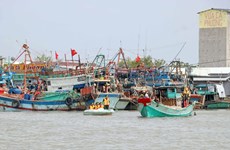Raising status for social enterprises in Vietnam
State incentives and a solid legal framework for social enterprise are
not yet in place, said experts at the workshop entitled "Social
enterprise - From policy to practice" co-hosted recently by the Central
Institute for Economic Management (CIEM) and the British Council (BC) in
Hanoi. Report by the Vietnam Business Forum.
State incentives and a solid legal framework for social enterprise are
not yet in place, said experts at the workshop entitled "Social
enterprise - From policy to practice" co-hosted recently by the Central
Institute for Economic Management (CIEM) and the British Council (BC) in
Hanoi. Report by the Vietnam Business Forum.
Silent contributions to the community
According to studies performed by CIEM and the British Council, Vietnam currently does not have a legal framework for social enterprises, so they have not been formally recognised. The social enterprise model is quite new and not yet widespread. Social enterprises are mainly formed spontaneously or transformed or restructured from old non-governmental organisations (NGOs). Hence, most of them cannot stand on their own financial incomes. Their production and business operations are able to afford 50 percent of their operating costs and social purposes. Without official State recognition, social enterprises encounter a lot of difficulties when they do business with their partners.
Pham Kieu Oanh, Director of the Centre for Social Initiatives Promotion (CSIP), said that for the time being, there is no a common concept of social enterprises, which varies from locality to locality and with each perspective. However, in most common sense, social enterprises are thoses that perform and pursue the objective of social development and environmental protection in the form of a business entity.
Social enterprise may have different legal forms, depending on countries, like non-governmental organisations, charity foundations, cooperatives or private businesses. They, either profitable or unprofitable, are similar to other businesses as they are organised and managed in the form of an enterprise. However, they are different from other forms of enterprises as they are created to solve social issues like poverty, environmental pollution and child protection.
The research on 11 social enterprises by the Spark Centre, a social development centre, shows very positive results. One of the examples is Evergrowth dairy cooperative model. With its daily dairy purchase and selling activities, Evergrowth purchases and sells 16 tonnes of milk a day with a price difference of 2,000 VND per kilo. In 2012, Evergrowth’s revenue grossed 72 billion VND (3.384 million USD) and its profit was 3 billion VND, of which 40 percent share was distributed to its members and the remainder was used for further investment and development, benefiting over 3,000 farmers, of whom 90 percent are Khmer, a minority group. Before the project was launched, 60 percent of households were poor but many have now escaped from poverty with a monthly income of 3 million VND from each dairy cow.
Another example is Tri Duc Emergency Transport Service 115 based in Yen Bai province. Starting with just 12 employees in 2009, the company has to date transported 2,000 patients from their homes to hospital or transferred amongst hospitals safely with a preferential service charge of only 15,000 VND per km, equal to the taxi fare. In 2012, the company’s revenue was 1.2 billion VND and the profit was 200 million VND. Thereby, the company has helped the poor in the region to access emergency service at a rate that is 10-30 percent lower than normal rates. Also according to the research by the Spark Centre, in 2012, every firm involved in agriculture had revenues ranging from 600 million VND to 319 billion VND and together they brought benefits to 60-10,000 people. In healthcare, the revenue ranged from 300 million VND to 15 billion VND and beneficiaries were 20,000 people.
Towards sustainable development
According to research by the British Council, the current difficulties of social enterprises are their shortage of specific business strategies and plans, community service ideas, and others. In addition, the 2005 Law on Enterprises does not explicitly define provisions on establishment, operational method, rights and obligations of social enterprises. In the meantime, a true social enterprise must make clear why it is established, who it serves, what is the purpose of its products and services, how it affects the target audience in society. To date, social enterprises are still likened to other commercial enterprises and they thus do not get preferential State treatment like corporate income tax, export duties, credit support and infrastructure support.
Nguyen Dinh Cung, Acting President of CIEM, said the Law on Enterprises needs to be amended and supplemented with some provisions recognising the legal status of social enterprises. He also suggested two solutions to greater sustainable development of this kind of business. Firstly, that social entrepreneurs be allowed to receive funds from stakeholders to create development investment capital. Secondly, that social enterprises be legally recognised and given preferential policies concerning tax and land as other types of businesses in Vietnam.
Accordingly, the draft law, Cung said, also proposed to obligations subject to social enterprises: Complying and maintaining their principles and goals during the operational time; operating for the sake of solving social and environmental problems as registered. In addition, social enterprises cannot use granted funds for purposes rather than compensate costs for community service activities.
Some experts suggested clear definitions for social enterprises in order to distinguish from charitable organisations in order to prevent abuse of charitable activities for illicit benefits.-VNA
Silent contributions to the community
According to studies performed by CIEM and the British Council, Vietnam currently does not have a legal framework for social enterprises, so they have not been formally recognised. The social enterprise model is quite new and not yet widespread. Social enterprises are mainly formed spontaneously or transformed or restructured from old non-governmental organisations (NGOs). Hence, most of them cannot stand on their own financial incomes. Their production and business operations are able to afford 50 percent of their operating costs and social purposes. Without official State recognition, social enterprises encounter a lot of difficulties when they do business with their partners.
Pham Kieu Oanh, Director of the Centre for Social Initiatives Promotion (CSIP), said that for the time being, there is no a common concept of social enterprises, which varies from locality to locality and with each perspective. However, in most common sense, social enterprises are thoses that perform and pursue the objective of social development and environmental protection in the form of a business entity.
Social enterprise may have different legal forms, depending on countries, like non-governmental organisations, charity foundations, cooperatives or private businesses. They, either profitable or unprofitable, are similar to other businesses as they are organised and managed in the form of an enterprise. However, they are different from other forms of enterprises as they are created to solve social issues like poverty, environmental pollution and child protection.
The research on 11 social enterprises by the Spark Centre, a social development centre, shows very positive results. One of the examples is Evergrowth dairy cooperative model. With its daily dairy purchase and selling activities, Evergrowth purchases and sells 16 tonnes of milk a day with a price difference of 2,000 VND per kilo. In 2012, Evergrowth’s revenue grossed 72 billion VND (3.384 million USD) and its profit was 3 billion VND, of which 40 percent share was distributed to its members and the remainder was used for further investment and development, benefiting over 3,000 farmers, of whom 90 percent are Khmer, a minority group. Before the project was launched, 60 percent of households were poor but many have now escaped from poverty with a monthly income of 3 million VND from each dairy cow.
Another example is Tri Duc Emergency Transport Service 115 based in Yen Bai province. Starting with just 12 employees in 2009, the company has to date transported 2,000 patients from their homes to hospital or transferred amongst hospitals safely with a preferential service charge of only 15,000 VND per km, equal to the taxi fare. In 2012, the company’s revenue was 1.2 billion VND and the profit was 200 million VND. Thereby, the company has helped the poor in the region to access emergency service at a rate that is 10-30 percent lower than normal rates. Also according to the research by the Spark Centre, in 2012, every firm involved in agriculture had revenues ranging from 600 million VND to 319 billion VND and together they brought benefits to 60-10,000 people. In healthcare, the revenue ranged from 300 million VND to 15 billion VND and beneficiaries were 20,000 people.
Towards sustainable development
According to research by the British Council, the current difficulties of social enterprises are their shortage of specific business strategies and plans, community service ideas, and others. In addition, the 2005 Law on Enterprises does not explicitly define provisions on establishment, operational method, rights and obligations of social enterprises. In the meantime, a true social enterprise must make clear why it is established, who it serves, what is the purpose of its products and services, how it affects the target audience in society. To date, social enterprises are still likened to other commercial enterprises and they thus do not get preferential State treatment like corporate income tax, export duties, credit support and infrastructure support.
Nguyen Dinh Cung, Acting President of CIEM, said the Law on Enterprises needs to be amended and supplemented with some provisions recognising the legal status of social enterprises. He also suggested two solutions to greater sustainable development of this kind of business. Firstly, that social entrepreneurs be allowed to receive funds from stakeholders to create development investment capital. Secondly, that social enterprises be legally recognised and given preferential policies concerning tax and land as other types of businesses in Vietnam.
Accordingly, the draft law, Cung said, also proposed to obligations subject to social enterprises: Complying and maintaining their principles and goals during the operational time; operating for the sake of solving social and environmental problems as registered. In addition, social enterprises cannot use granted funds for purposes rather than compensate costs for community service activities.
Some experts suggested clear definitions for social enterprises in order to distinguish from charitable organisations in order to prevent abuse of charitable activities for illicit benefits.-VNA













